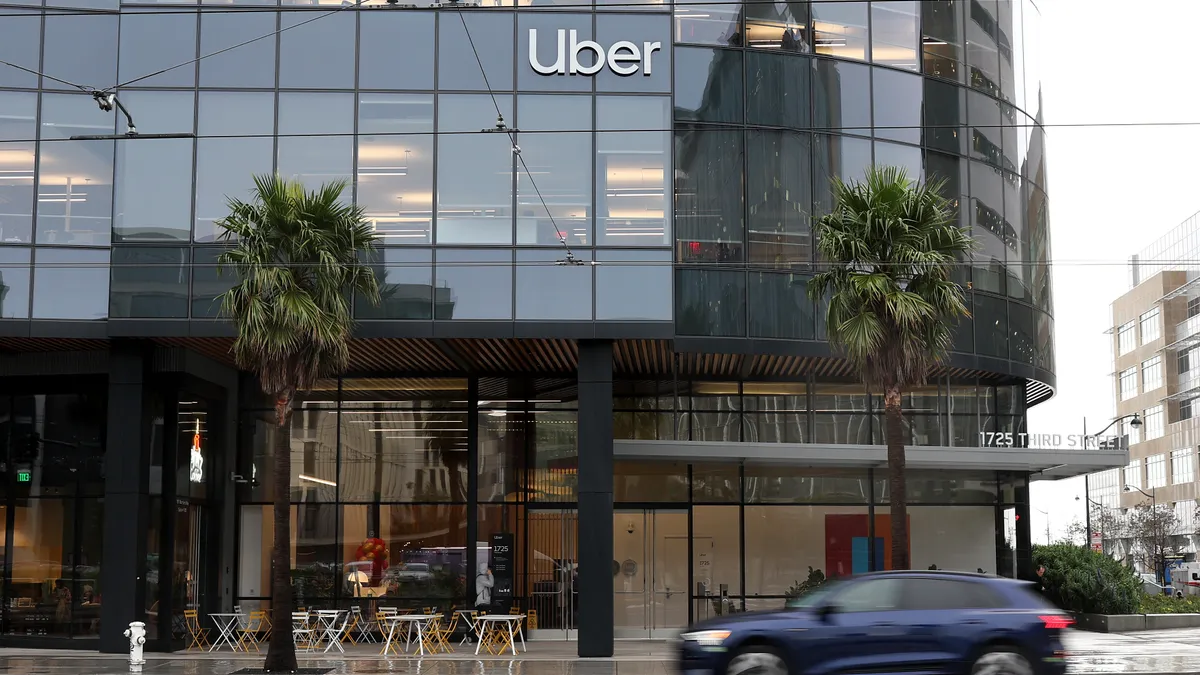Dive Brief:
- A couple who suffered severe injuries riding with an Uber driver must take their complaint against the company to arbitration, having agreed to waive their jury trial right, a New Jersey appeals court ruled last month in a case that has drawn national media headlines. Binding arbitration clauses are common across countless consumer user and employment agreements governing products from mobile phones to tax-preparation software to cable TV service.
- Georgia and John McGinty said their minor daughter had agreed to Uber’s “terms of use” in January 2022 while placing an Uber Eats order with her parents’ permission. Two months later, the couple were injured when their Uber driver failed to stop for a red light, according to the ruling. Uber says it has only one user agreement and that Georgia McGinty had agreed to its terms three separate times since her first use of the rideshare app in 2015.
- “Despite assertions to the contrary, the court concluded that the plaintiff herself — not her teenage daughter — agreed to Uber's Terms of Use, including the arbitration agreement, on multiple occasions,” Uber Technologies said Thursday in a statement. The company said its arbitration motion does not affect the plaintiffs’ claim against the driver, Jia Zheng, for whom Uber has a state-mandated $1.5 million auto liability policy, or “50 times more coverage than a typical driver is required to carry.”
Dive Insight:
Binding arbitration clauses have increased significantly in corporate user agreements and employment offer letters as companies seek to resolve disputes in a forum that offers less legal expense and quicker resolutions. Arbitration also helps defendants avoid class actions and the kind of nuclear verdicts jury trials can present.
The American Arbitration Association said in its annual report that it had more than 500,000 cases filed last year for the first time since the organization’s founding in 1926.
On Sept. 20, a three-judge panel of the New Jersey appeals court reversed a Superior Court ruling last year denying Uber’s motion to compel arbitration of the McGintys’ complaint.
The court found that Uber’s arbitration provision “clearly and unambiguously evidences a waiver of plaintiffs' right to pursue any claims against Uber in a court of law and obligates plaintiffs to resolve their claims through binding arbitration.”
A person using Uber’s platform for a ride or restaurant delivery must agree to the user terms before they can proceed to a particular service. They must also be 18.
The couple intends to file a motion for reconsideration at the appeals court by Oct. 11, and, if the court declines, would then appeal to the New Jersey Supreme Court, one of their attorneys, Evan Lide of Stark & Stark PC, told Legal Dive Thursday in an email.
“This is not only about my clients’ plight, but this decision has a negative effect on millions of other consumers as well,” he wrote.
The Uber lawsuit is the second compelled arbitration case in three months to draw national media headlines.
In August, Walt Disney Parks and Resorts abandoned its motion to compel arbitration of a complaint filed by the husband of a New York doctor who died in October 2023 after she suffered an acute allergic reaction to nuts and dairy from a restaurant on a Disney property near Orlando, Florida.
Disney argued that the woman’s husband, Jeffrey Piccolo, had agreed in 2019 to arbitrate any disputes when he signed up for a Disney+ streaming video account. The company later dropped its motion, agreeing to let the case proceed in a court.
Walt Disney did not respond to a message from Legal Dive seeking comment on that litigation.
The company “strive(s) to put humanity above all other considerations," Disney Experiences Chairman Josh D'Amaro said in an Aug. 20 statement to Ars Technica. "With such unique circumstances as the ones in this case, we believe this situation warrants a sensitive approach to expedite a resolution for the family who have experienced such a painful loss.”
In response to forced arbitration, many trial lawyers have filed arbitration demands in bulk, by the tens of thousands, hoping to provoke a defendant to settle, the U.S. Chamber of Commerce and Mayer Brown attorneys argued in a 2023 white paper. Defendants typically bear the fee burden for arbitration proceedings.
When a firm files as many as 100,000 demands “does it really intend to resolve those claims on the merits?” attorneys Archis Parasharami, Andrew Pincus and Kevin Ranlett wrote. “Or is the goal to use the costs of instituting an arbitration — which are disproportionately borne by companies when consumers or employees initiate arbitration — to coerce a settlement without regard to the merits of the underlying claim?”
Corporations rely heavily on arbitration as a way to obtain “fair and reasonable” outcomes, said Michael Mezzacappa, a partner with Coffey Modica LLP. Courts have become overly burdened, with litigation taking as much as five years in many states, he said.
“The jury verdicts the last 10 and 20 years are going nuclear,” said Mezzacappa, whose defense practice focuses on insurance cases. “An arbitrator is not going to sit there and give billions of dollars to somebody. Jurors are freely giving money away and it’s a problem for all of us.”
Consumers should also focus more attention on the agreements that they’re asked to sign in the course of their everyday lives, he said. “I think that society over time has learned to sign things without reading them.”
Georgia McGinty, an attorney who practices family law, believes that “consumers need to be protected,” Lide said.
“I am hopeful that the New Jersey Supreme Court is going to continue to protect the rights of consumers, but if we are unable to overturn the appellate decision, I think we need to look to a legislative fix,” he wrote. “Although the legislative fix may be too late for the McGintys, we want to do whatever we can to help other consumers in similar situations.”











